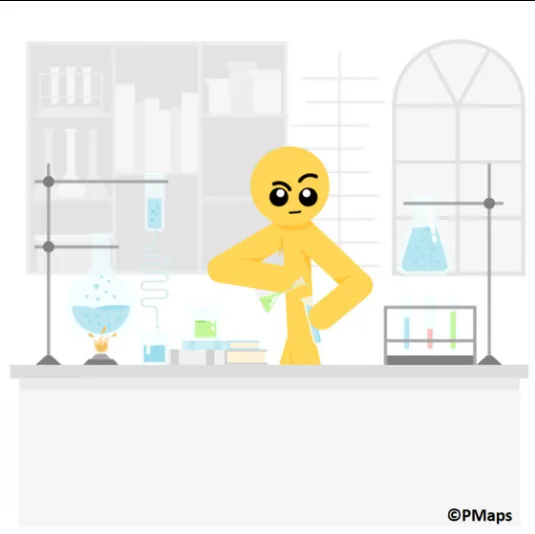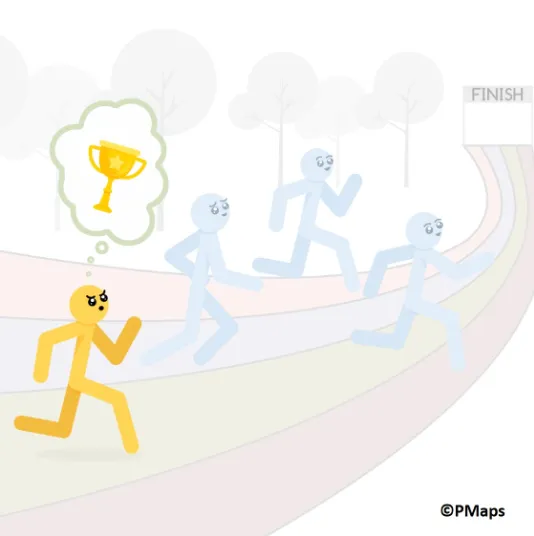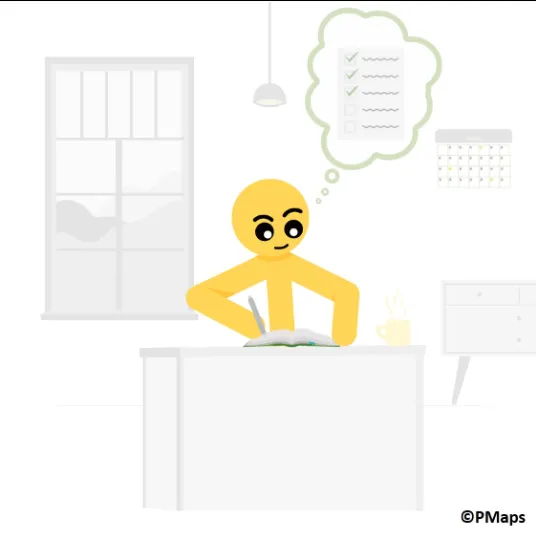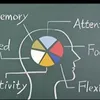How stick figures help this HR tech startup pick the right person for the right job
Delhi-based Pmaps offers data-driven visual psychometric tests for hiring people, especially for blue-collar jobs. The aim is to help companies reduce time and cost of hiring and ultimately attrition, as the right people are hired for the right jobs.
Do you relate to what the character is doing in the following images? How you connect with the images can say a lot about your personality. Read on to know more.



The above images are part of a psychometric assessment test developed by Delhi-based HR tech startup . The company has redesigned psychometric hiring tests using visuals, moving away from conventional text-based evaluation.
The ‘main character’ in the images could be running a race, making a checklist, staring at the sunset, or feeling nervous while smiling for a group photo. The candidates are required to say if they relate to the image or not.
There aren’t right or wrong answers here, for what’s analysed are the candidate’s personality and behaviour in different situations. The test’s algorithm tries to determine qualities such as empathy, leadership, and patience.
“Humans learnt visual as a sign before text or calligraphy. We all relate to pictures,” says Saurabh Rana, Founder, Pmaps. “Visuals are universal and are more likely to get an honest answer than a text-based question asking if a person is empathetic or not.”
The startup, founded in 2015 by Saurabh Rana and Tarvinder Kaur, offers customised non-technical tests for different sectors and roles. Tarvinder, who built the tech platform, is the business head of the company.
“Many times candidates are not savvy enough to read English, and it becomes difficult to assess them,” says Saurabh. For blue-collar workers and people who have dropped out of college or school and do not have a great affinity for words, visuals work better, he says.
How the test works
Candidates have to look at a set of 22 images and see if they relate to them or not. They have to answer ‘yes’ or ‘no’ questions based on this.
Each answer determines the question the candidate gets next. Saurabh compares this to dating app Tinder, where every profile or image that’s swiped left or right determines the next image that shows up. For some candidates, audio clips are also played to assess how they feel after listening to them.
All responses together generate a psychometric profile of the candidate who’s applying for roles in delivery, customer service, or sales.
“Our assessment is shorter, more fun, and language agnostic,” says Saurabh.
Pmaps’ visual assessment is for 15 minutes, unlike text-based tests that take 45-60 minutes.
How it all began
In 2014, Saurabh was an investment banker at Axis Bank, where he had to pitch deals and help companies raise funds. During this stint, he noticed that behaviour was a crucial factor in determining what deals went through. For instance, fear or greed determined financial investments, when rationality took a backseat. So intrigued was he by the role of behaviour psychology in finance that he quit his job and went back to college to study psychology.

Saurabh, who already had a master’s in business administration and an engineering degree, was keen on equipping himself in psychology. So, he enrolled himself in an applied psychology course at Tata Institute of Social Sciences.
Here, Saurabh worked on projects that relied on pictures, illustrations and signs to inform and convince people to change their behaviour. One of the projects involved educating the people of Matunga in Mumbai about not crossing train tracks, using signboards instead of text. In another project, he used pictures to encourage patients in hospitals to use soap dispensers and sanitisers.
“I started realising that you can nudge people towards a better habit through pictures,” says Saurabh.
This understanding provided the bedrock for Pmaps, as he realised the role visuals could play in the evaluation of candidates.
Building Pmaps
Saurabh, along with his team, spent two years researching and building the product, including an online invigilation tool and a survey engine.
He wanted to build a science-backed, data-driven model using information technology. But, unlike other sectors, psychology doesn’t have too many historical records to build a machine learning model. So the task was cut out for Saurabh—generate datasets, categorise data, and then build an algorithm to analyse candidates.
Saurabh worked with telecom operator Vodafone and obtained the previous records of its employees. Then he collated datasets from the records and connected the responses of employees (to tests and questionnaires) to their performance. Over time, he could notice commonalities and point out the factors that decided how employees performed. Based on the insights gathered, Saurabh developed an algorithm and eventually visual assessments for Vodafone.
With these assessments that evaluated candidates’ ‘empathy’, Vodafone was able to hire people who were suitable for customer support and fit for training. This ultimately helped Vodafone stem employee attrition, and the company became Pmaps’ first paid customer. Following this, the startup bagged other telecom customers.
Pmaps uses a similar approach to help companies evaluate candidates’ soft skills and leadership ability in the sales function. It has also developed assessment tests for logistics, delivery, and ecommerce.
Growth so far
The startup has more than 50 clients, including Max Life Insurance, Vi, Dish TV, and RBL Bank. It says it has a revenue pipeline of $100,000.
Improving hiring outcomes is the broader vision with which Saurabh started Pmaps. The company has conducted over 2 million assessments in India till date. It claims its solutions have reduced the time involved in hiring by 60%, improved hiring outcomes, and reduced attrition by 5-7% for recruiters.
What has worked for Pmaps is the way the job market has changed. According to Saurabh, many jobs in India today, especially in the growing sectors of e-commerce and food delivery, do not need people with high qualifications. Therefore, candidates have to be assessed on soft skills and personality. Five years ago, most openings were in white-collar jobs. But today, there are new possibilities, he says.
Last month, Pmaps raised Rs 5 crore in a Series A funding round led by Indian Angel Network and Lets Venture.
Globally, companies such as Pymetrics, AMCAT, and Mercer Mettl use text-based evaluation. In the visual assessment space, Pmaps competes with Tratify, owned by US-based conversation recruitment company Paradox.
The worldwide personality assessment solutions market is expected to grow to $16.5 billion by 2028, at a CAGR of 12.1% during 2021-28, according to a report by The Insight Partners.
Road ahead
Pmaps conducts 20,000 tests a month. In the coming months, it plans to increase this number by five times and expand its presence beyond India to Gulf, UK, USA, and South Asia. The company also aims to cross an annual revenue of $1 million in the next 10 months.
Edited by Swetha Kannan








